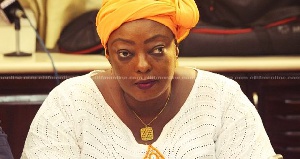 Freda Prempeh, Deputy Minister, Gender, Children and Social Protection
Freda Prempeh, Deputy Minister, Gender, Children and Social Protection
The Anti-Human Trafficking Units of the Ghana Police and Immigration Services had 20 convictions for offences of human trafficking and 12 for other related offences in 2018.
Madam Freda Prempeh, a Deputy Minister of Gender, Children and Social Protection, said out of the total, 13 were on child labour offences.
Whereas 14 individuals were charged and convicted for child labour exploitation and fined 120 penalty units whilst 10 individual defendants were charged with human trafficking offences and jailed between five and seven years.
She said within the period under review, 92 cases were investigated; out of this number, the Police investigated 77, Immigration 14 cases and the Economic and Organised Crime Office (EOCO) one case.
Madam Prempeh, who made the revelation on Friday during the commemoration of the World Day Against Human Trafficking – “Blue Day” in Accra, said there was a significant improvement in 2018 in terms of prosecution unlike 2017 when they had only four convictions.
The event was organised by the Ministry of Gender, Children and Social Protection in collaboration with civil society with funding from the British High Commission.
It was to give stakeholders the opportunity to find out how far they had come in the fight against human trafficking in Ghana.
The United Nations defines human trafficking as the recruitment, transportation, transfer, harbouring, or receipt of persons by improper means (such as force, abduction, fraud, or coercion) for an improper purpose including forced labour or sexual exploitation.
Each year, the UN observes the World Day Against Trafficking in Persons, to raise awareness, encourage vigilance and gain support for the prevention of human trafficking.
Madam Prempeh said there were two public shelters in the country for victims of human trafficking, one for adult female victims which was operational and receiving victims and also the children shelter.
She said the Ministry had four psychologists managing these shelters to ensure that clients get the best support that they could.
She said human trafficking was an organised crime and this phenomenon was recognised as a global challenge, affecting millions of people including women and children and hampering their fundamental rights and freedoms.
She stated that the modus operandi of the perpetrators of this heinous crime against humanity was through the recruitment, transportation, harbouring, and receipt of victims of trafficking for purposes of exploitation.
She said exploitation takes the form of physical, sexual, emotional and psychological abuse of victims.
She recounted that in 2015, a study conducted by the International Justice Mission (IJM) which focused on the southern part of the Volta Lake revealed that, out of the 771 children interviewed, it was discovered that more than half of the children were victims of trafficking, 23 per cent were under the age of six and more than half were under the age of 10.
The Deputy Minister said Winneba, Ningo and Ada were found as Source communities while Akosombo, Kpeve, Kpando and the Island communities on the Volta Lake were the destination communities.
She said Chapter five of the 1992 Constitution guaranteed the fundamental human rights and freedoms of all persons; specifically articles 16 and 17 stipulate that no person shall be subjected to inhuman and degrading treatment.
She said to prevent, protect and punish offenders of human trafficking, Ghana signed the Palermo Protocol in 2000 and ratified in 2012.
Madam Prempeh said through these efforts, Ghana was currently ranked a Tier Two country on the United States Department of Labour tier ranking of countries; adding that ‘this depicts that, the Government is making great efforts to combat human trafficking in Ghana’.
Mr Thomas Hartley, the Deputy British High Commissioner to Ghana, said the UK was partnering with the Government of Ghana to protect the most vulnerable and marginalised through the “Leave No One Behind” social protection programme.
“It is supported with £39.2 million of UK funding over the next five years,” he said.
“A key component of the programme supports a centralised channel for beneficiaries of all social protection programmes to raise grievances and report violations and other abuses, report malpractices, and request information on all social protection programmes.”